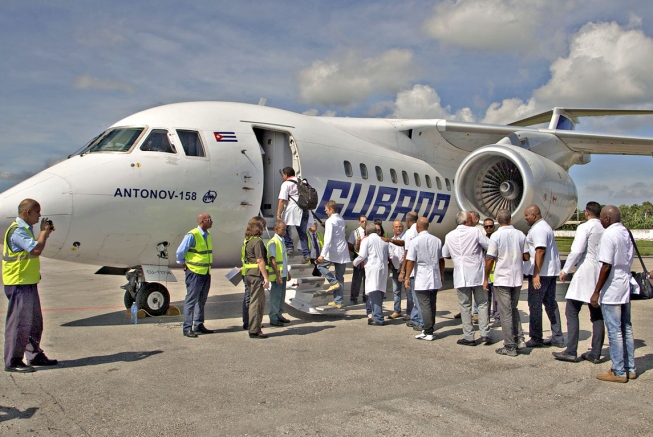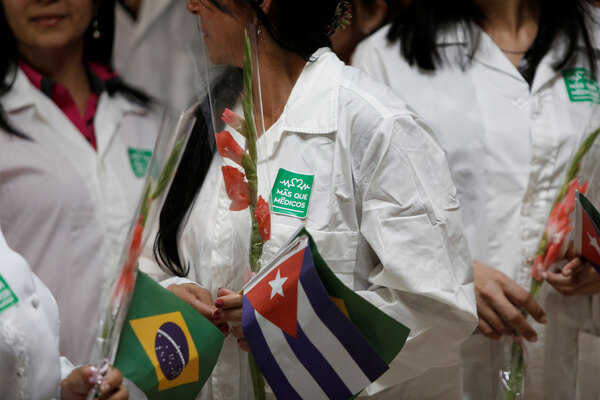RIO DE JANEIRO, BRAZIL – Cuban doctors who worked in the ‘Mais Médicos’ (‘More Doctors’) program and decided to remain in Brazil even after Cuba broke its cooperation agreement with the country in November 2018, are expected to be reinstated in basic care facilities in the coming weeks.
Bolsonaro’s government is preparing a public notice, to be issued in February, which provides for the reinstatement of 1,800 professionals on a two-year contract. They will not need to have undergone the Revalida – the examination that enables the validation in Brazil of degrees achieved abroad.
Currently, according to data from the Ministry of Health, there are 757 vacant positions, due to the persistent dropout of substitutes in the most vulnerable municipalities. As intended by ex-President Rousseff’s More Doctors program, the plan is for Cubans to fill these vacancies and strengthen the network of basic care in extremely poor and inaccessible cities, which historically have great difficulties in maintaining doctors.
The Cubans’ performance in basic care has been a controversial issue and was the target of criticism from President Jair Bolsonaro when he was a federal deputy. Bolsonaro challenged the skills of these professionals, who were allowed to practice medicine exclusively in the More Doctors program without validation of their degrees.
“We are going to expel the Cubans from Brazil with Revalida,” the president declared in an interview at the Presidente Prudente airport (SP) during his 2018 presidential campaign. Bolsonaro also stated that these professionals were in Brazil to “form guerrilla groups” and compared their hiring model in the country to “slavery”.
The Cuban doctors worked in the country through an agreement with Cuba mediated by the Pan American Health Organization (PAHO), in which 70 percent of their salaries would go to the Cuban government and the remainder would be paid to the professionals. Cuba has a similar agreement with other countries, which yields R$42 billion per year in hard currency.
During the debate on the new Médicos para o Brasil (‘Doctors for Brazil’) program in Congress, an amendment included the exceptional reinstatement of Cubans who were already working for the More Doctors program.
The Ministry of Health stresses that this decision was not the government’s, but rather the result of a law passed by legislators. President Bolsonaro sanctioned the amendment. Last year, the government had already pointed to the prospect of reinstating these professionals. The program coordinator, Mayra Pinheiro, even made contact with some of these professionals through Telegram during the government’s transition period.
“This possibility is there, we are even looking for these Cuban doctors, and we are concerned from a humanitarian perspective about how they are living in Brazil. We are interested in finding them through the Federal Council of Medicine (CFM) and reinstating them into the activity with the Council’s assessment and the potential revalidation of their degrees,” she said at the time.
Now, with this reinstatement, Cuban doctors will be granted the full program grant, which is approximately R$12,000 per month. And, just like when they were dismissed, they will not be required to have their degrees validated. Erno Harzheim, the Secretary of Primary Health Care at the Ministry of Health, explains that the program to be launched in the next few days will come in a new format, since it is a public bid notice and not a decree.
It will be specifically directed at Cuban professionals who were working in basic care for the More Doctors on November 13th, 2018 (when Cuba announced its withdrawal from the program after criticism from the newly elected Bolsonaro). Another requirement is that they have remained in the country until August 1st, 2019, as naturalized citizens, residents or with a petition for refuge. This is a reference date because it is the date of the Provisional Measure that established the new government program, the Doctors for Brazil.

“There’s no bid notice. All 1,800 Cuban doctors who meet these requirements will be recalled,” Harzheim says. The number of hires will depend on these professionals’ voluntary appearance. Since the end of cooperation with Cuba a year and three months ago, hundreds of Cuban doctors have been waiting for Bolsonaro’s go-ahead to return to practice their profession in the country. Without the Revalida since 2017, they had been working in general services, which ranged from alternative therapies to health clinic supervision.
The struggle to return to the program was faced with the resistance of the medical lobby, with strong influence in reshaping the program to provide professionals in this administration. The Federal Council of Medicine historically demands the requirement of Revalida and the offer of vacancies exclusively to professionals with the CRM (Registration of the physician in the Regional Council of Medicine).
The Government has been gradually moving from the former More Doctors to a new design in the Doctors for Brazil program, now specifically focused on the most vulnerable cities. As a result, the several notices that have been issued over the past year have excluded the larger municipalities, capital cities and metropolitan regions. To replace the positions left vacant by Cuba’s decision to terminate the agreement, the government initially issued notices exclusively for Brazilian doctors.
As the positions were not entirely filled, notices were issued for Brazilian doctors trained abroad who had also failed to revalidate the degrees in the country. The positions were not offered to foreign professionals, the focus of criticism to the More Doctors program, although there was a provision in the law that established the program in 2013. Now, with at least 757 positions still vacant only in the most vulnerable cities due to the dropout of substitute doctors, the government will reinstate Cuban doctors.
Source: El Pais


